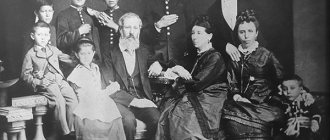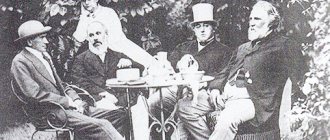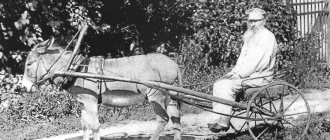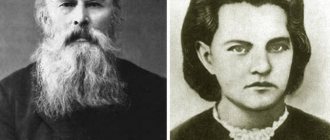Youth and education
His subsequent education continued at the Faculty of Philosophy at Moscow University. During the same period of time, his first satirical works began to be created and published in Moscow magazines.
In 1760, after studying at the university for a couple of years, Denis Ivanovich moved to St. Petersburg as one of the best students. There he managed to make new acquaintances, quite influential personalities for that period of time: Mikhail Lomonosov and Alexander Sumarkov. Knowledge of many languages allowed Denis Ivanovich Fonvizin to work as a professional translator; he translated numerous fables by Holberg, as well as the works of Terrason and Voltaire, into Russian. In 1762, he served as a translator at the College of Foreign Affairs.
Public service. Mature creativity
From 1777 to 1778, Fonvizin spent abroad and spent a long time in France. Returning to Russia in 1779, Denis Ivanovich entered the service as an adviser to the chancellery of the Secret Expedition. At the same time, the writer was translating the book “Ta-Gio”. In 1783, Fonvizin created one of the best works of Russian journalism - “Discourse on Indispensable State Laws.”
Since 1781, Denis Ivanovich has taken the place of state councilor. In 1782 he retired. In the autumn of the same year, the premiere of the playwright’s most important work, the comedy “Minor” (written in 1781), took place in St. Petersburg. In 1783 the play was staged in Moscow.
Creative path
The first satirical comedy “The Brigadier,” created in 1768, received a wide response; moreover, the work on the production helped to embody the author’s personal interest in the theater. The fame that the comedy gained helped the writer Denis Ivanovich Fonvizin become more recognizable in high circles. In addition, thanks to this, Denis Ivanovich was invited to Peterhof to see Empress Catherine II. Since 1769, Fonvizin worked as N.I.’s secretary. Panin (head of the Collegium of Foreign Affairs).
Fonvizin spent a couple of years abroad and returned to his homeland in 1779. In March 1782, after the removal of N.I. Panin from business, Fonvizin decided to resign from his position, devoting himself entirely to literature and creativity. A year later, he created one of the best works, in the opinion of many Russian publicists, “Discourse on Indispensable State Laws.” In the same 1782, the premiere of one of the author’s most recognizable works, the comedy “Minor,” took place in St. Petersburg.
In his works, the author touched upon social problems that pointed to the unjust power of the nobility. He noted the importance of developing patriotism and was an interesting author of his time. An educated and sensible man all his life he was an enemy of autocratic tyranny and permissiveness of the tsar's favorites. Critics noted that reliable and truthful thoughts reflected in his works and related to contemporary Russian life for him could be attributed to the chronicles of that time.
Brief biography of Blok Fonvizin D.I.
Option 1
Denis Ivanovich Fonvizin is a Russian writer of the 18th century, creator of Russian everyday comedy. He became most famous for his work “The Minor” (1781). Born on April 14, 1745 in Moscow into a wealthy noble family. He received his education at the noble gymnasium at the University of Moscow. He studied the same at the Faculty of Philosophy and was considered one of the best students.
In 1760, the young writer was sent to St. Petersburg, where he met Lomonosov and Sumarokov. In 1761, he was commissioned to translate fables from German. Later he translated the novel by the French writer Terrason, the tragedy of Voltaire, the works of Ovid, and the story of Gresse. However, he considered Rousseau his favorite writer.
Along with translations, satirical works by Fonvizin begin to appear. So, around 1760, an early version of the famous play “The Minor” was ready. Literature also helped the writer in his career. For example, Voltaire’s translation of the tragedy helped him get into the service of the cabinet minister Elagin. And the empress herself became interested in the comedy “Brigadier” that he translated. Thus, he met N.I. Panin, the tutor of Paul I, and went into his service.
In 1777, the writer traveled to France, where he spent a long time. There he observed political life in French society and tried to find ways to improve the socio-political order in his homeland. At the end of 1782, the work “Discourse on Indispensable State Laws” appeared, intended for the future ruler Pavel Petrovich.
After suffering paralysis, Fonvizin retired, but continued to engage in literary activities until the end of his life. Some of his works were condemned by Catherine II and were banned. In recent years, the writer has been working on the autobiographical story “Frank Confession.” Denis Fonvizin died in December 1792 in St. Petersburg and was buried in the Alexander Nevsky Lavra.
Option 2
Born on April 14, 1745 in Moscow into a wealthy noble family. Received a good home education. In 1755-1760 studied at the gymnasium at Moscow University, then for a year at the university’s Faculty of Philosophy.
As a student, he began publishing in Moscow magazines, translated Moral Fables by the Danish playwright, historian and philosopher L. Holberg, and began translating Voltaire's tragedy Alzira. In 1762 he moved to St. Petersburg and took the position of translator at the College of Foreign Affairs. In 1769 he created the satirical work “Message to My Servants...”.
Interest in the theater was expressed in work on the original Russian satirical comedy “The Brigadier” (1766-1769; staged in 1770). In 1769, Fonvizin became secretary to the head of the Collegium of Foreign Affairs N.I. Panin. In 1777-1778 he traveled abroad; it is described in “Notes of the First Journey”.
In 1781, the writer’s most significant work appeared - the comedy essay “The Minor.” In March 1782, after Panin was removed from business, Fonvizin resigned, deciding to devote himself entirely to literary creativity.
In 1783, he published a number of satirical works: “The Experience of a Russian Estates Member,” “A Petition to the Russian Minerva from Russian Writers,” “The Narrative of an Imaginary Deaf and Mute.” In 1784-1785 the writer visited Germany and Italy, anonymously published “The Life of Count Nikita Ivanovich Panin” in French, painting the image of an ideal enlightened nobleman.
In the last years of his life, Fonvizin was seriously ill, but did not give up his literary pursuits - he began the autobiographical story “A sincere confession of my deeds and thoughts.” He died on December 13, 1792 in St. Petersburg, and was buried in the Alexander Nevsky Lavra.
Option 3
Fonvizin Denis Ivanovich was born in April 1745 in Moscow. His parents were wealthy nobles who were able to provide him with a good education.
Young Denis studied first at the gymnasium formed at Moscow University, and after that at the Faculty of Philosophy at the university itself. Even during his student years, his short works began to be published in Moscow magazines. In addition, Fonvizin was engaged in translations of literary works of foreign writers.
After graduating from university, Fonvizin went to St. Petersburg, where he began working at the College of Foreign Affairs as a translator. During his work as a translator, the writer did not stop creating works, which were mainly written in the form of satirical comedies, since he was very interested in theater.
In the 80s of the 18th century, such satirical works as “The Experience of a Russian Estates Member” were published, as well as the comedy “The Minor”, which brought fame to the writer.
Towards the end of his life, the writer began to get seriously ill. However, regardless of health problems, he continued to create. At this time, Fonvizin began work on his autobiography. DI. Fonvizin passed away in 1792, leaving behind a legacy of Russian literature.
Personal life
The only thing known for certain about the personal life of the outstanding writer is what he himself decided to share in his autobiographical story. From there you can learn about Anna Priklonskaya, who captivated his mind and heart in his youth and did not leave him until the end of his life. Anna reciprocated his feelings, but was married.
Fonvizin himself married a little later to Katerina Khlopova. Moreover, many noted Fonvizin’s increased attention to his appearance, for which he was considered a dandy. He always looked smart and liked to add decorations in the form of fresh flowers to his clothes.
The childhood of the famous playwright
The future Russian writer was born in April 1745 in Moscow. All members of his family were nobles and came from a knightly family (which moved to Russia from Germany in the middle of the 14th century). Denis Ivanovich's father rose to the rank of major and left the service. Despite their noble status, the Fonvizin family had a modest income.
Young Denis Fonvizin, unlike his noble peers, did not study French. Before entering school, the future writer knew only Russian. Already in an educational institution, he began to study German.
Until 1755, Fonvizin studied at home. After completing his primary education, he entered the noble gymnasium, and then the Moscow University (Faculty of Philosophy). Already 5 years after entering an educational institution, Denis Ivanovich goes to St. Petersburg as a “chosen student.” It was here that the future writer would meet such personalities as Alexander Sumarokov and Mikhail Lomonosov.
Interesting Facts
About the life and work of D.I. Fonvizin preserved interesting facts:
- Fonvizin's favorite writer is Jean-Jacques Rousseau, a French thinker and revolutionary.
- The author became famous among his contemporaries not for his works, but for his brilliant translations. Only after the success of Voltaire's Alzira did the reading public pay attention to the work of their compatriot.
- Fonvizin was an influential politician and was a member of the board that developed laws to mitigate serfdom.
Interesting facts about the writer
Usually in textbooks you can read only the most important things in a short biography of Fonvizin. More information about the writer should be sought in other sources. Here are some interesting facts about Fonvizin:
- The playwright’s ancestor was captured by the Russians during the Livonian War and was later baptized into Orthodoxy.
- When the writer arrived in St. Petersburg in 1760, he visited the theater for the first time. The play made such an impression on him that he began to often go to such establishments.
- Fonvizin's favorite writer was Jean-Jacques Rousseau.
- The first production of the comedy “The Minor” was so successful that almost all the spectators threw wallets full of money on the stage.
- Fonvizin was a dandy. He always took care of his appearance. He decorated clean and ironed clothes with flowers, wore a sable frock coat and shoes with large buckles.
- A. S. Pushkin admired the playwright and appreciated his comedic creativity. The poet even dedicated a poem to him. And Belinsky considered him the most interesting writer.
Denis Fonvizin was distinguished by talent, great intelligence and broad erudition. Although he came from a family of noble intellectuals, he is remembered as an outstanding man of his era.
The creative path of a state councilor. Start
Denis Ivanovich’s creative path began during his years of study. While still at the university, the writer was engaged in translating foreign articles for university publications. The first works he translated were:
- Alzira or Americans;
- Heroic virtue, or the life of Seth, king of Egypt;
- Holberg's Fables.
In parallel with his translation activities, Fonvizin created his own works. His early texts had a sharp satirical bent.
The creative life of the writer was tightly intertwined with his work. At the age of 18, the young man was employed in the civil service of Catherine II. From the position of “Secretary of the Cabinet Minister” after 6 years, Fonvizin moves to the position of “Personal Secretary of Count Panin”.
Denis Ivanovich’s own works were presented to the world already in 1760. Fonvizin's fame as a writer came to him only 8 years after his first publication. The reason for the public outcry was the play “The Brigadier” released by the writer.
Interesting fact: after the publication of “The Brigadier,” Fonvizin was urgently summoned to Peterhof. It was here that the writer personally read the comedy to Catherine.
The satirical comedy was an unprecedented success. It was read by all segments of the population. Based on the book, productions were created that did not leave the stage for a long time.
The main creative period of Denis Ivanovich’s life
The initial stage of the already mature and deep creativity of the writer is considered to be 1778, when Fonvizin began to create the famous comedy “The Minor.” The writer was inspired to write it by a trip to France, which helped Denis Ivanovich assess the current social situation of his homeland using a comparative example.
The playwright worked on “The Minor” for more than 4 years. The plot of the book is based on a description of noble society and one of the most important problems of any time - illiteracy. The play turned out to be very realistic. It revealed many problems, and all the vices were described directly by the author. It was this straightforwardness, as well as the colorful images of the main characters, that brought the work crazy (for that time) popularity.
Another work, which became the next step in Fonvizin’s development as a famous publicist, was “Discourse on Indispensable State Laws.” The book was written for the future Emperor of Russia Paul.
In 1783, the writer went abroad again. This time - on a trip to Europe. However, this trip was not destined to last long. Just 2 years after his arrival, the playwright suffers an apoplexy. And after another 2 – he returns to his homeland. Paralysis forced Fonvizin to leave public service. However, he in no way influenced Denis Ivanovich’s craving for creativity.
After the first attack, the publicist also continues his creative work. He published in magazines and published small (compared to previous) comedies: “A Conversation with Princess Khaldina”, “The Tutor’s Choice”. But not all of Fonvizin’s creative biography is so serene. The last 5-volume edition of the writer was critically received by Catherine the Great. She considered the book unworthy of publication and banned its publication.
The last work the writer worked on was his autobiography “Frank Confession.” In it, the playwright described in detail his creative path and life in general.
Getting an education
Since childhood, Denis Fonvizin was drawn to new knowledge and began to receive an excellent education at home. From the age of 4, his father taught him to read and write and foreign languages. And at the age of 10 (in 1755) he became a student at the noble gymnasium at Moscow University together with his brother Pavel (future senator). The brothers were the best high school students and an example for everyone. There the future writer studied languages: German, Latin, French.
In addition, Denis was very eloquent and had the gift of literature; his works were often read out at ceremonial events in the gymnasium. He was also distinguished by his wit, so he was invited to take part in theatrical productions. He spent 5 years in the gymnasium - from 1755 to 1760. From 1759 to 1761 he was a student at the university's Faculty of Philosophy.
Fonvizin, together with his younger brother Pavel, was sent in 1760 to meet the curator of the University I. I. Shuvalov in St. Petersburg as the best students, where he met Lomonosov. Later, he meets with the first director of the Russian theater, Alexander Sumarokov (known for his works “Dmitry the Pretender”, “Vysheslav”, “Ariston”). After this acquaintance, he attends a theatrical performance for the first time, which made an indelible impression on him and delighted him.
It was after this performance that his love for theater began. It was a production of the play “Henry and Pernille” by the famous Danish writer, who can rightfully be considered the founder of Danish drama, Ludwig Holberg. Subsequently, Fonvizin would translate a huge number of his works into Russian.
During his studies, for his achievements in the “higher German class” and in the “highest Latin class” he was awarded one silver and 2 gold medals. In total, Fonvizin spent 7.5 years at the university - until 1762.








